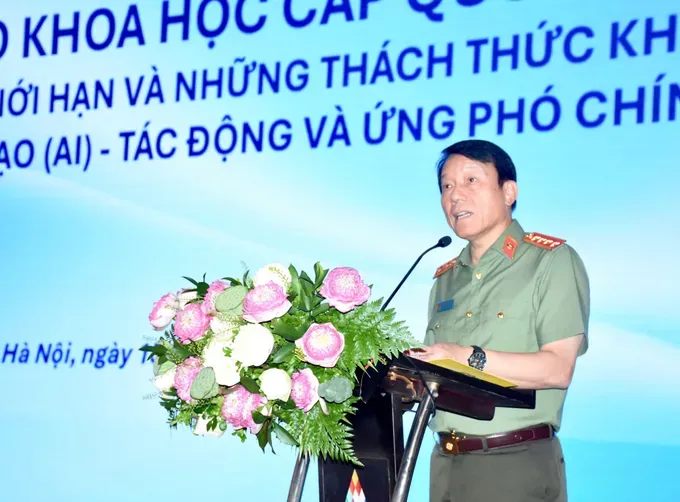
His remarks were made at a scientific conference held today in Hanoi, focusing on the ‘Unlimited power and unpredictable challenges of artificial intelligence (AI) - Impact and policy response’.
The conference was organized by the Ho Chi Minh National Academy of Politics in collaboration with the Ministry of Public Security, the Ministry of National Defense, the Central Theoretical Council, and the Ministry of Science and Technology. The event attracted nearly 400 delegates from various Party and State agencies, academic institutions, and businesses, reflecting the widespread interest in AI as the ‘new productive force’ of the digital era.
According to Minister Luong Tam Quang, AI represents a key technology of the Fourth Industrial Revolution, with the potential to reshape the global order. He referenced Resolution 57, which identifies science and technology, innovation, and digital transformation as crucial for the country's development. Within this framework, he stated that AI is positioned to play a transformative role.
However, the Minister also cautioned that this potential is accompanied by unprecedented challenges. He warned that without a proper development strategy, AI could pose risks to technology and ethics, as well as legal frameworks, national security, data sovereignty, and potentially exacerbate social inequality.
Minister Luong Tam Quang underscored the importance of integrating an AI ecosystem with national interests, emphasizing the need to ensure technological sovereignty and data security. He asserted that AI should not be viewed as a market-driven technology alone but must be a core component of a comprehensive national strategy for sustainable development and security.
Professor Nguyen Xuan Thang, Member of the Politburo and Director of the Ho Chi Minh National Academy of Politics, as well as Chairman of the Central Theoretical Council, stated that artificial intelligence (AI) presents a ‘golden opportunity’ for Vietnam to achieve significant advancements, while also introducing risks related to social security, inequality, privacy violations, and national security. He underscored that ‘technology is a tool, and people are the objective’, highlighting the necessity for national policies to support both the business sector and society.
During the workshop, Minister of Science and Technology Nguyen Manh Hung indicated that AI could contribute as much as US$79.3 billion, which is approximately 12 percent of the Gross Domestic Product by the year 2030, provided it is widely implemented. Currently, Vietnam holds the 51st position out of 188 countries in the AI readiness index, boasts hundreds of AI startups, and around 75 percent of businesses have adopted this technology.
Minister Nguyen Manh Hung also mentioned that by the end of this year, Vietnam plans to unveil a new version of its national AI strategy and finalize the AI law, viewing it as a ‘declaration of national vision’ that prioritizes people, manages risks appropriately, and safeguards digital sovereignty.
The presentations during the workshop concentrated on three main areas, including recognizing AI as a crucial production force; evaluating economic, social, and security risks; and suggesting policies for the development of autonomous, safe, and humane AI. Experts also highlighted several challenges, including a shortage of high-quality human resources, inadequate research infrastructure, and a weak semiconductor industry.
The workshop emphasized the pressing need for a comprehensive, long-term strategic direction for AI, which includes establishing an innovation ecosystem, implementing stringent laws, enhancing human resources, and ensuring data and privacy protection. The recommendations and proposals generated from this event will be considered for inclusion in the document to be presented at the 14th National Party Congress.
























